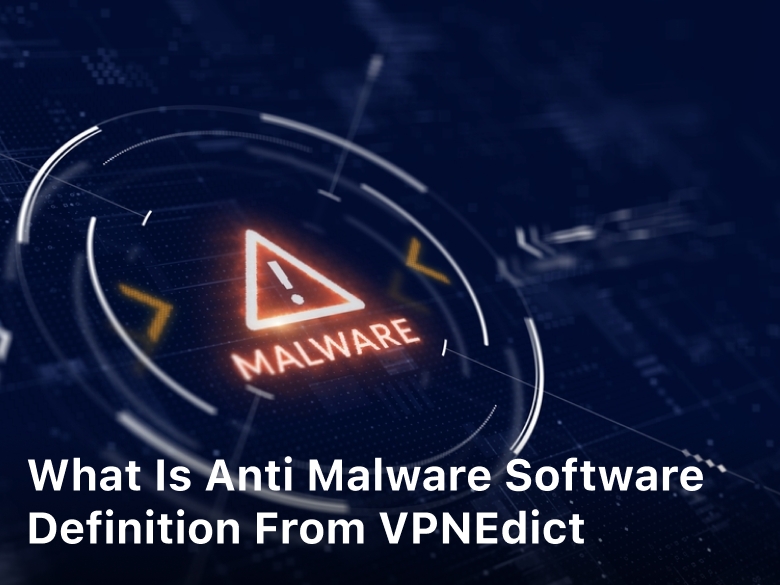What is Anti Malware Software Definition From VPNEdict
What is Anti Malware Software Definition From VPNedict – Discover the significance of anti malware solutions and their role in ensuring comprehensive cybersecurity. Learn how to shield your digital presence effectively with the right anti malware tools.
In today’s interconnected digital landscape, cybersecurity stands as a paramount concern. Amid the ever-evolving threat landscape, the need for robust defense mechanisms has become non-negotiable.
This article sheds light on the pivotal question: What is Anti Malware? We will delve into the intricacies of anti malware, exploring its purpose, features, benefits, and how it contributes to fortifying your online presence against malicious actors.
What is Anti Malware?
Anti malware, short for anti-malicious software, refers to a range of software tools and techniques designed to detect, prevent, and mitigate various forms of malicious software, commonly known as malware.
Malware encompasses a broad spectrum of digital threats, including viruses, worms, Trojans, spyware, adware, and ransomware, among others. The primary goal of anti malware solutions is to safeguard computers, devices, networks, and data from these harmful entities.
Anti malware software operates by employing sophisticated algorithms and heuristics to identify and neutralize malware threats before they can compromise the integrity and security of your digital assets. It acts as a digital guardian, working silently in the background to scan files, websites, emails, and other digital content for any signs of malicious intent.

The Importance of Anti Malware
In an era where digital interactions and transactions have become commonplace, the significance of anti malware cannot be overstated. Here’s why:
1. Protection Against Diverse Threats
Modern malware comes in various forms, each with its unique method of attack. Anti malware solutions provide comprehensive protection against this array of threats, ensuring a robust defense mechanism against evolving digital risks.
2. Preserving Data Integrity
Data is the lifeblood of the digital age. Anti malware software acts as a shield, preventing unauthorized access, data breaches, and potential loss of sensitive information.
3. Safeguarding Privacy
Malware often invades your privacy by spying on your activities or harvesting personal information. Anti malware tools thwart these invasions, preserving your online privacy.
4. Mitigating Financial Losses
Ransomware, a type of malware, can hold your data hostage until a ransom is paid. Anti malware solutions help prevent such attacks, sparing you from potential financial losses.
5. Maintaining System Performance
Malware can bog down your devices and networks, causing sluggish performance. Anti malware software ensures optimal system performance by keeping these digital adversaries at bay.
Keep Reading : What Is Crypto Malware? And how to detect it
Exploring Anti Malware Features
Anti malware solutions come equipped with a plethora of features designed to counteract the diverse tactics employed by cybercriminals. Some notable features include:
1. Real-Time Scanning
Anti malware software employs real-time scanning to monitor files and activities in real-time. This proactive approach allows it to detect and neutralize threats as soon as they emerge.
2. Heuristic Analysis
Heuristic analysis involves identifying new and potentially unknown threats based on their behavior and characteristics. Anti malware tools use this technique to detect malware variants that have not yet been explicitly identified.
3. Quarantine and Removal
When a threat is detected, anti malware software isolates the infected files in a secure quarantine. This prevents the malware from spreading while giving users the option to remove or disinfect the affected files.
4. Automatic Updates
To stay ahead of emerging threats, anti malware software often receives automatic updates from security providers. These updates ensure that the software’s database is equipped with the latest malware definitions and detection algorithms.
5. Firewall Integration
Many anti malware solutions integrate with firewalls to provide an additional layer of protection. Firewalls act as a barrier between your network and potential threats, blocking unauthorized access.
How to Choose the Right Anti Malware Solution
Selecting the appropriate anti malware solution requires careful consideration of your specific needs and preferences. Here are some key factors to keep in mind:
1. Features and Capabilities
Evaluate the features offered by the anti malware software. Look for real-time scanning, heuristic analysis, firewall integration, and automatic updates for comprehensive protection.
2. User-Friendly Interface
An intuitive and user-friendly interface ensures that you can navigate the software effortlessly. This is crucial for effectively managing and customizing your security settings.
3. Resource Impact
Consider the impact of the anti malware software on your device’s performance. Opt for a solution that provides strong protection without significantly slowing down your system.
4. Customer Support
Prompt and reliable customer support is essential in case you encounter any issues or require assistance with the software. Ensure the provider offers adequate support channels.
5. Compatibility
Verify the compatibility of the anti malware solution with your operating system and other software applications. Compatibility ensures seamless integration and functionality.
FAQs About Anti Malware
Q: Can anti malware replace my existing antivirus software?
A: While some anti malware solutions offer antivirus capabilities, they are not necessarily synonymous. It’s advisable to use both for comprehensive protection.
Q: Is free anti malware software effective?
A: Free anti malware software can provide basic protection, but premium versions often offer more advanced features and timely updates for enhanced security.
Q: How frequently should I scan my system for malware?
A: Regular scans are recommended, ideally at least once a week. However, real-time scanning ensures continuous protection against emerging threats.
Q: Can anti malware prevent all types of cyberattacks?
A: While anti malware significantly reduces the risk of cyberattacks, no solution can guarantee absolute protection. It’s crucial to practice safe online habits.
Q: Can I use anti malware on mobile devices?
A: Yes, many anti malware solutions offer mobile versions tailored to the specific security needs of smartphones and tablets.
Q: Are software updates important for anti malware?
A: Yes, software updates ensure that your anti malware solution is equipped to detect and counter the latest malware variants effectively.
Conclusion
In a digital landscape teeming with cyber threats, understanding and implementing robust cybersecurity measures is imperative. Anti malware stands as a formidable defender, shielding your digital realm from the perils of malicious software.
By embracing the insights shared in this article, you can empower yourself with the knowledge to make informed decisions and select the right anti malware solution to fortify your digital presence.
Keep Reading :




